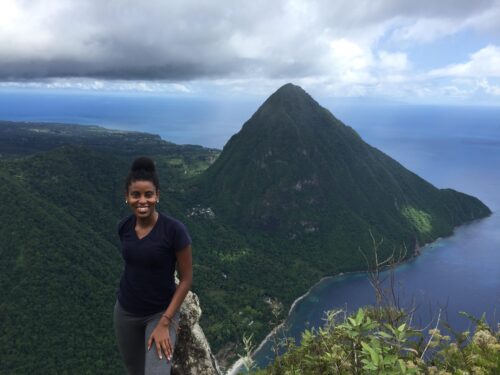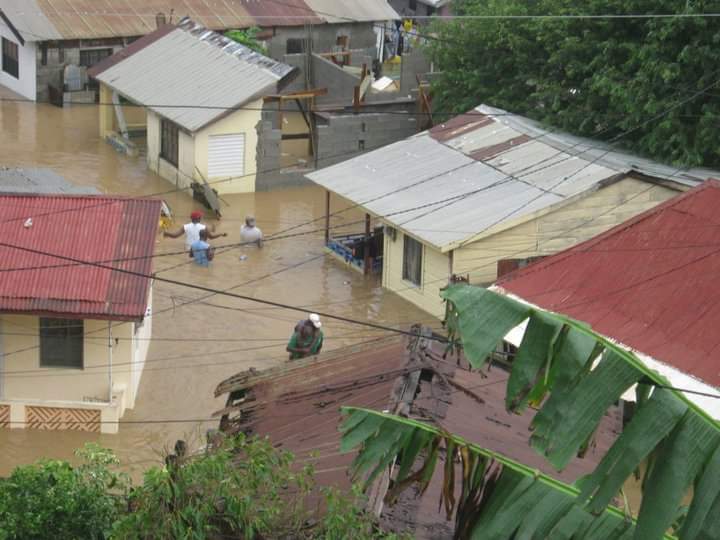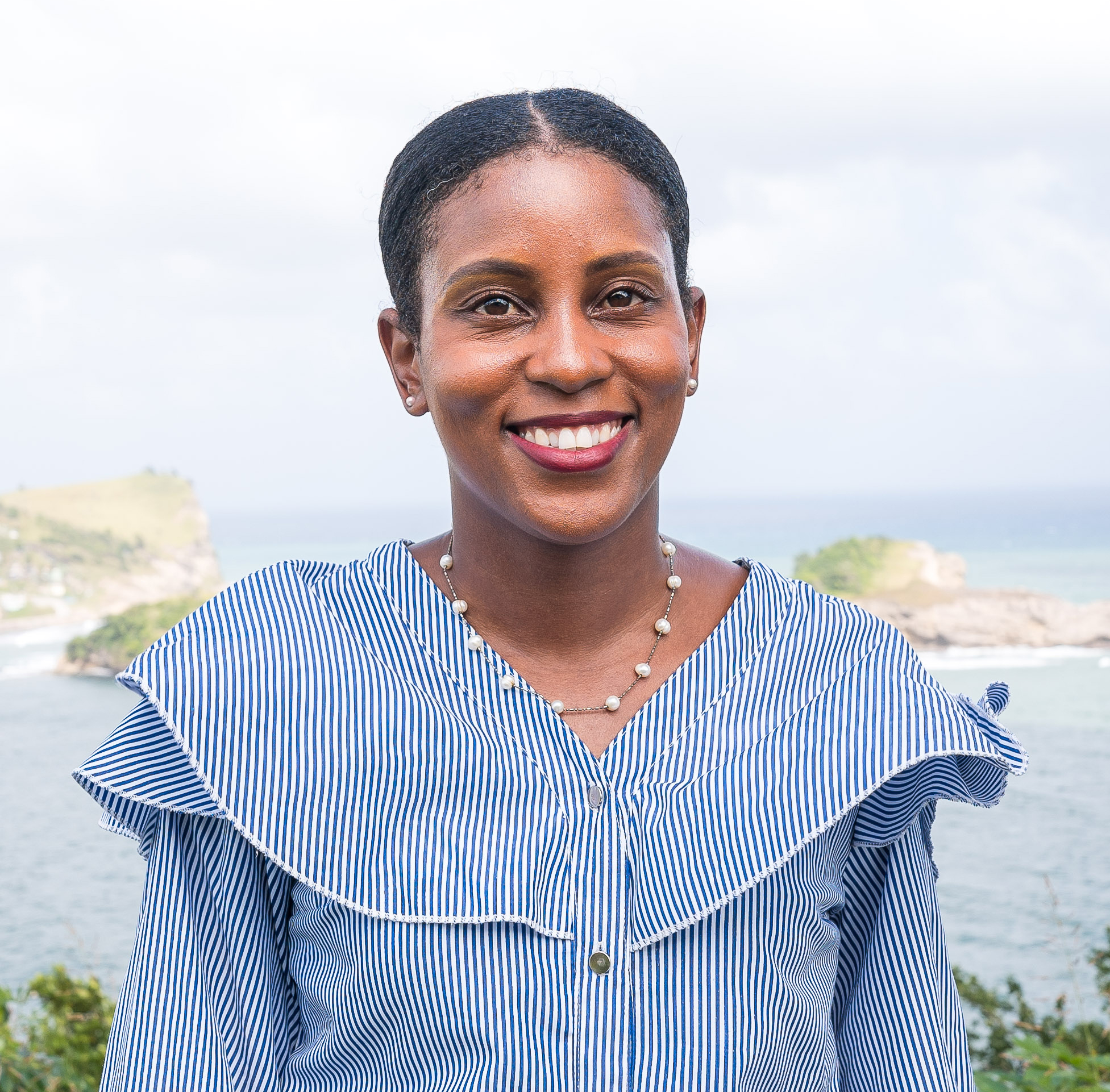
How to Hold Back a Storm: Financing Critical Infrastructure Projects in the Caribbean
Skeeta Carasco, the CFAN climate finance advisor in Saint Lucia, is working to help her country get the support it needs for resilience in the face of climate change.
In the rainy season, storms pummel Saint Lucia, a small Eastern Caribbean Island nation. When they hit, the torrential rain and flooding forces local systems to shut down — the aging infrastructure is simply not designed to handle those levels of inundation. This is especially true in the rural areas, where the water systems often shut off during heavy downpours since the water won’t be drinkable from the tap.
When Skeeta Carasco steps out of her home in Dennery, St Lucia, after a storm, she often sees intakes that are clogged or inaccessible due to roads being washed out. Even in urban areas, big storms can bring disaster to the water system. In 2010, when Hurricane Tomas hit, even the heart of Saint Lucia’s economic area was without water for weeks and two intakes were destroyed and had to be rebuilt completely. People desperate for clean water will go to medical centers, only to learn that even hospitals are suffering from a lack of potable water.

What’s needed, Carasco now knows, after years working with Saint Lucia’s water and energy sector regulator, are investments to climate-proof and harden infrastructure to make it more resilient to storms. The island needs upgrades; increased water storage capacity within water systems; more water treatment and collection systems; improved infrastructure for roads, pipes, and intakes; and a more resilient energy system.
The problem — similar to many other small island states — is a lack of sufficient funding for these critical projects. Because the rainy season is getting less predictable and the impacts more intense, improving the resilience of critical infrastructure is indistinguishable from battling climate change itself. “Climate finance,” Carasco says, “is perhaps the biggest challenge that Caribbean countries and Small Island Developing States face when it comes to mitigation and adaptation to climate change.”
Fortunately, this is exactly what Carasco is there to work on. She’s the first member of a cohort of locally hired, highly trained, dedicated climate finance advisors to be embedded in Caribbean countries with a mandate to develop pipelines of projects that will help these nations stay strong under the onslaught of climate change.
The Climate Finance Access Network (CFAN), designed and coordinated by RMI, has been around since 2021. Currently there are eight countries in the Pacific with CFAN advisors who, between them, have unlocked $88.3 million in climate financing and have a pipeline of $464 million more. Now the Network is growing internationally to soon cover a total of 18 small islands governments and regional organizations. Hiring is actively underway for six additional advisors to join Carasco supporting the Bahamas, Barbados, Grenada, Jamaica, St. Vincent and the Grenadines, and the Caribbean Community Climate Change Centre (CCCCC).
Carasco has been in this role since June. As the inaugural Caribbean CFAN advisor, she is looking forward to welcoming new colleagues and continuing to dig deeper into the work she’s already undertaken. She grew up in Saint Lucia, and lived without access to electricity for the first 16 years of her life. Deeply committed to advocacy for those who have the least, she has seen firsthand the impacts of climate change on aging infrastructure and across agriculture, health, and utility sectors. She understands intimately the need for resources and funding to realize Saint Lucia’s development and sustainability goals.
She has also seen how good intentions can go awry if they don’t take into account the perspectives and insights of the communities they’re designed to serve. She recalls a fisheries complex gifted to a local community by a foreign entity. It was well intended and well appreciated — but unfortunately, no local knowledge was considered in the design of the project. As a result, it was developed without understanding the local currents, causing costs to its maintenance to balloon as the complex is constantly inundated with sand — simultaneously impacting and accelerating erosion on a nearby beach. “Imagine,” Carasco says, “if they had taken into account local and traditional knowledge. Then the gift might have been utilized as intended — as a net benefit to the community and economy.”
This is where key facets of Carasco’s role come into play. Not only does she have deep knowledge herself from living on the island and working in Saint Lucia’s utilities, but she also includes stakeholder consultation as a critical part of her work to design climate finance project proposals. She meets with the engineers, the healthcare workers, the utility representatives, and others across sectors to make sure that critical perspectives are taken into consideration. “I always knew this sort of consultation was important, but it’s never been so evident,” Carasco says. “Bringing those diverse perspectives and knowledge together helps ensure the success of a project.”
Carasco’s work as a CFAN advisor connects her closely with her RMI colleagues and efforts to mobilize climate finance for truly catalytic change. RMI has established Project Preparation and Development Facilities (PPDFs) in the Caribbean and other regions to help utilities and project developers in the most vulnerable, early stages of clean energy projects, to ensure projects can receive the necessary funding to come on line. Project preparation and development activities include aligning the ecosystem of local partners to ensure project success; facilitating the necessary pre-project development investment tasks including economic analysis, site suitability, and land acquisition; and influencing the necessary policy and regulatory reform needed.
As part of this, Carasco is currently working in collaboration with RMI’s Islands Energy Program on several clean energy projects in Saint Lucia, comprised of eight solar and battery storage microgrids at critical facilities, including water treatment centers. She describes it as an opportunity to build the resilience of institutions and communities that rely on this critical infrastructure, in particular increasing resilience of St Lucia’s main hospital, which serves more than 60 percent of the population. Schools will also benefit, as well as the island’s emergency response coordination, which can be problematic during big storms like Tomas.
Microgrids will not only enhance the resilience of the island’s infrastructure and economy, but will also help lower energy costs. Currently Saint Lucians primarily rely on imported diesel fuel, which is expensive and volatile, heavily impacted by the geopolitical environment. The pressures of fuel prices have contributed to an increased cost of living and crimes of desperation and displacement. But money saved from implementing a distributed, renewable grid can be redirected to social programs.
Carasco’s colleague, Nadia Wells-Hyacinth, the chief economist for the Government of Saint Lucia says that Carasco “has distinguished herself by her expertise, experience, confidence and commitment. We have very high expectations of Skeeta as the first representative of the Caribbean Cohort.” She describes Carasco as an integral member of St. Lucia’s climate finance teams and adds, “We are encouraged by her enthusiasm, commitment and zeal to advance our climate finance agenda.”
While working on funding proposals might seem like just a small piece of the puzzle, Carasco describes the role of a CFAN advisor as “finally connecting the dots.” She is in a position to see the big picture and draw the necessary connections for funders to both meet the needs and enhance impact across projects and sectors.
“CFAN has allowed me to connect the dots between critical infrastructure work, climate resilience, and the needs of communities,” Carasco says. “I am now in the best position to make a difference, because finance is the biggest challenge that Caribbean countries face.”
